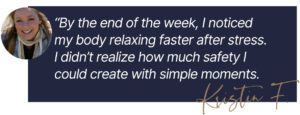Perfectionism and anxiety are two sides of the same coin. One tries to control everything; the other constantly warns that control might slip away. Beneath both lies the same longing: to feel safe, worthy, and at peace.
You might call yourself a “high achiever.” You work hard, aim high, and love doing things well. But when striving turns into self-pressure; that’s not motivation anymore. It’s your nervous system trying to protect you through performance.
In my coaching work, I often see this pattern: the harder we chase perfection, the further we drift from ease. Let’s look at seven ways to soften the grip of perfectionism and anxiety so you can move through life with more space, joy, and self-trust.
Table of Contents
1. Notice All-or-Nothing Thinking

Perfectionism whispers “all or nothing.” Calm begins in the space between.
Perfectionism tells you that unless something is flawless, it’s a failure. You either nail it or you’ve wasted your time. This kind of thinking keeps your nervous system on constant alert, interpreting every “almost there” as danger.
Try catching those absolute words: always, never, ruined, perfect. Replace them with flexible language like progress, learning, or in process. Each time you reframe, you teach your body that mistakes aren’t threats.
If this resonates, you may also enjoy How to Start Accepting What Is, a guide to finding steadiness when life doesn’t go to plan.
2. Soften Unrealistic Standards

Releasing the rigidity of high standards can invite a more innovative product.
High standards are healthy when they expand you. They become harmful when they exhaust you. Perfectionism and anxiety thrive when every task feels like a test.
Ask yourself: Would I expect this much from someone I care about? If not, it’s time to adjust the goalpost. You don’t need to abandon ambition, you just need to remove the fear that fuels it.
Healthy striving says, “I’ll give my best.”
Perfectionism whispers, “If I fall short, I’m not enough.”
3. Reframe Failure as Feedback

Failure isn’t a verdict, it’s a conversation with growth.
Perfectionism fears failure because it mistakes mistakes for identity. Anxiety heightens that fear, making even small errors feel catastrophic.
Take one slow breath and remind yourself: This is feedback, not proof of my worth. Every challenge reveals something about timing, support, or how you treat yourself under pressure.
4. Notice How Self-Criticism Keeps You Stuck

Compassion is how the nervous system learns to rest.
The inner critic believes it’s helping. It thinks self-blame will prevent future pain. But in reality, criticism keeps your body braced. The muscles tense, the breath shortens, and anxiety grows. In turn, this reduces your sense of self-worth over time.
Try talking to yourself the way you would to a friend who’s struggling: I see you trying. I know you care. You’re allowed to rest.
Compassion isn’t indulgence it’s regulation. The moment you shift from attack to understanding, your nervous system begins to exhale.
5. Replace A Behaviour with B Behaviour

When you release impossible standards, joy sneaks back in.
Perfectionism and anxiety rely on rigid habits always doing things “the right way.” The antidote is gentle experimentation: small, intentional acts of imperfection that retrain your brain for safety.
Try these:
-
Skim a chapter of a book instead of reading every word.
-
Leave the bed slightly messy.
-
Arrive five minutes late for something that truly doesn’t matter.
-
Allow silence during a conversation instead of filling it.
At first, this will feel uncomfortable. That discomfort is your nervous system learning that “imperfect” isn’t unsafe.
Reduce your expectations one small step at a time. If you try to “not care” overnight, the mind will resist and that resistance feels like anxiety.
Our brains dislike sudden change, but they adapt beautifully to small ones. Every time you act imperfectly on purpose and nothing bad happens, you create a new memory of safety. Over time, your system stops fighting you, and the world feels less fragile.
Free Resource to Ease Perfectionism and Anxiety
✨ You’ll love my free one-week guide, 7 Days of Regulation—a simple, daily practice that helps calm perfectionism and anxiety through breath, grounding, and self-compassion.
✦ Download Your Free Guide ✦ →

6. Pause Before You Fix

A single pause can change the entire tone of your day.
Perfectionism and anxiety tell you that urgency equals importance. The impulse to “fix” immediately is your nervous system trying to escape discomfort.
Next time you feel that rush, pause before acting. Name the feeling: I’m anxious because I value this.
Now notice your feet on the ground, how it supports you. Then allow anxiety to be here as a sensation. Instead of trying to resist it or obey it, let anxiety be here: not the thoughts about it, just as the sensations it brings: a tight chest, or quick breath.
That pause sends a powerful signal: you are not in danger, you’re just uncomfortable.
Learning to pause between trigger and response is one of the most healing skills you can build.
7. Celebrate Progress—Not Perfection

Progress deserves celebration; perfection was never the goal.
The perfectionist brain quickly forgets wins. It scans for what’s missing instead of what’s present. This keeps anxiety looping.
End each day by acknowledging three things that went well enough. Maybe you showed up even when tired. Maybe you stopped overthinking and started. Let it count.
This small daily practice trains your brain to see success as something you create, not chase. Over time, “good enough” becomes the new peace.
FAQ: Perfectionism and Anxiety
Q1. Why do perfectionism and anxiety often appear together?
They come from the same place—the body’s need for safety. Perfectionism seeks control, while anxiety warns when that control feels shaky.
Q2. How can I start easing perfectionism today?
Start small. Soften one expectation, take one imperfect action, breathe through the discomfort. Consistency, not intensity, builds calm.
Q3. Will I lose motivation if I stop being a perfectionist?
No. True motivation doesn’t disappear—it deepens. You’ll lose fear, not drive. When your nervous system feels safe, creativity and focus return naturally.
When You’re Tired of Going It Alone…
Perfectionism softens faster with support.
Together we’ll calm your nervous system, loosen old rules, and help you feel safe being seen as you are.
“Tess helped me calm my nervous system and find lasting change.” — Christine S.
